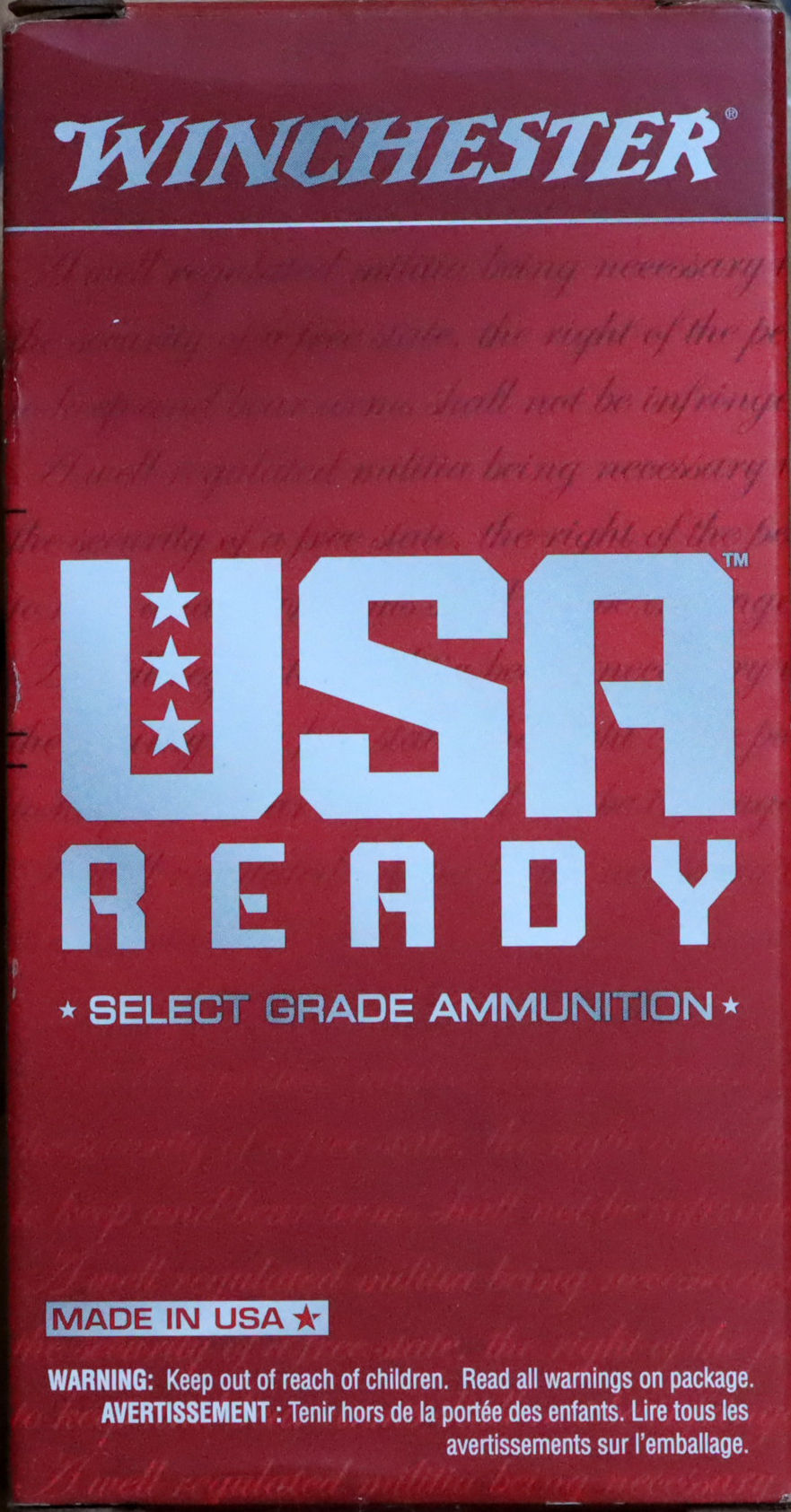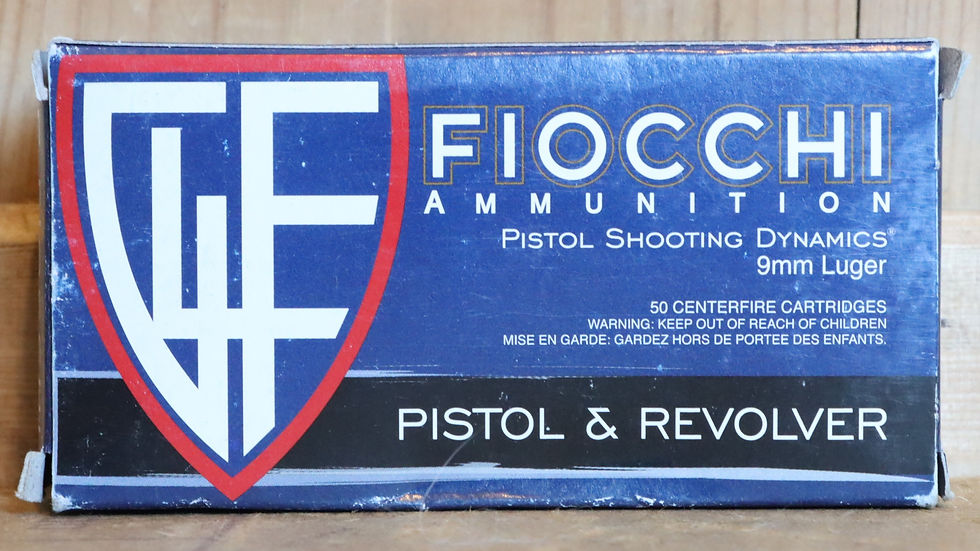THE 9mm Range Ammunition Guide
- Graham Baates
- Jul 15, 2023
- 8 min read
Updated: Mar 8, 2024
*Some of the external links found on this website are affiliate links. Those links use cookies to generate revenue and fund continuation of this website. By clicking an external link you are consenting to a temporary cookie, by purchasing from that link you are supporting this website. To opt out of cookies do not click external links.

With 23 loads tested, this was a very time- and resource-intensive piece to put together. My goal is to help folks find the best range ammunition for their needs as well as also familiarize readers with the options that are out there and how they might impact a shooting session.
What's Covered:
A complete chart in no particular order so you can compare loads against each other for your needs. Since it's a visual wall of data this cart is at the bottom of the article.
The Least expensive load and where to get it.
The most consistent load for those who want to know if a bad shot was them or the ammo.
The least-powerful load for those looking to reduce recoil, increase split times, or practice faster shooting.
The most-powerful load for those who want training to make defensive loads feel easy, those with finicky pistols, softer grips (limp wrist), or who simply want more power.
Re-label or different load? Winchester, Federal, and Remington all offer multiple 9mm 115gr loads. Is there any difference or is it just a relabel?

What's Not Covered:
Testing was a small sample size and so can not represent what may happen with small changes in production lot to lot.
How "clean" or "dirty" a particular load runs. While I certainly apprecaite cleaner-running ammo, in years of attending high round-count multi-day classes I've never had a gun foul up so badly it stopped working, nor slow down so much that a drop of oil couldn't get me through the day. Unless you plan on shooitng cases of ammo at a time between cleanings, I don't find pistol ammunition cleanliness as important as many say it is.

How these loads will run in your gun, with your grip. The test pistol (Grand power K100) was selected not only for its spectacular barrel quality, but also because it's a pistol I know very well. I can shoot it better with less effort than many other pistols, and know what to expect for a recoil impulse. This helped with recoil commentary given in the individual load test videos.
Fluctuations in pricing. Sales, supply issues, and retailer whims are out of my control. If you're really shopping check the links for more than one supplier of each load as "today's" price may be different.

Range Ammo IS NOT all the same:
The same load varies as much as $0.38/round depending on where you buy.
Muzzle Energy ranged from 297 to 341ft/lbs.
Average Muzzle Velocity ranged 220fps.
Standard Deviation in velocity (consistency) ranged from 4.27 to 28.86fps!
How to Gain From This Article if you already have a favorite:
Find a load you're familiar with on the chart at the bottom.
Consider your goals such as: cost, accuracy, reliability, and training needs.
Find three loads on the chart that outperform your current loads in meeting those needs.
Order a box of each (Sources are ranked by pricing, but it may save you shipping costs to get them all from one place).
Hit the range with your new ammo, try the same exercise or drill with each of them back to back.
Report your experience in the comment section so others can learn.
Loads sorted by category with top three by cost, consistency, high, and low energy. Loads not fitting into one of those listed at the bottom for cost reference.
Lowest Cost Per Round For when you're just looking for what's cheap. Because the difference in price per round can be so small, check how they rank for other attributes.
1st Place: Blazer Aluminum $0.22/round

Blazer Aluminum Test Video
1st Place (tie): Winchester USA Ready USA Ready $0.22/round

Winchester USA Ready Test Video
3rd Place: Freedom Munitions RN (new) $0.24/round

Freedom Munitions Test Video
Most Consistent (lowest standard deviation of velocity): For squeezing the most accuracy possible out of you range session. This is also good for reducing variables so you KNOW if it was you or the ammo that threw that round.
1st Place: Freedom Munitions RN (new) Standard Deviation of 4.27fps See above
2nd Place: Federal Champion Brass Standard Deviation of 5.42fps

Federal Champion Brass Test Video
3rd Place: Sellier & Bellot Standard Deviation of 6.47fps

Sellier & Bellot Test Video
Softest Shooting (least muzzle energy): Lower recoil is great for getting comfortable with a gun, or for learning to shoot faster and control the gun through rapid fire. Low recoil also comes with the risk of the pistol not fully cycling if it has a strong recoil spring, the gun is very dirty, or you don't have the best form. Poor form isn't just from grip, higher-end training can put you in unconventional shooting positions where providing the pistol propper support is challenging.
1st Place Sterling Brass 297ft/lbs of muzzle energy

Sterling Ammunition Test Video
2nd Place New Republic 304ft/lbs of muzzle energy

New Republic Test Video
3rd Place Fiocchi 9AP 306ft/lbs of muzzle energy

Fiocchi "9AP" Test Video
Most Powerful (most muzzle energy) Higher-recoiling loads are great for slogging through imprefect conditions such as a dirty gun, or compensating for a less-than-perfect grip. Higher recoil can also be used to simulate defensive loads for range training.
1st Place Winchester Active Duty 431ft/lbs of muzzle energy

Winchester Active Duty Test Video
2nd Place Winchester Service Grade 420ft/lbs of muzzle energy

Winchester Service Grade Test Video
3rd Place TulAmmo 374ft/lbs of muzzle energy

TulAmmo Test Video
Something I've always wondered, but neither tested nor seen tested was if there really is a difference between loads from the same brand. Logic tells us that if a brand figured out their ideal 9mm 115gr load they would produce that and just that. Maybe a company would create a higher-end and lower-end version when sales are slow to offer variety and price points. I've also wondered if sometimes those other labels are simply boxes they create to see if they can get away with selling the same stuff at a different price. Since some of the tests we did were of different loads from the same brand let's take a look at the charts and determine if there really is a difference.

I'm curious to hear what you think. To me the data looks different enough to feel that the loads are indeed different, and generally executed to a similar standard. The CCI/Blazer line is very similar in quality, with a bit more energy coming from the brass than the aluminum case. I wonder if the energy and velocity difference is from the better chamber sealing of brass or if the aluminum load simply has less powder. I'm assuming the upcharge on the Syntech is a combination of those rounds possibly costing more to make and the special "clean" primer they advertise with the Syntech line.
The range in energy suggests that the loads are indeed different, but RTP and American Eagle are very similar.
Winchester Loads

Colt may have folded and sold to foreign ownership, but Winchester's ammo still embodies some old West spirit. Maybe not as precisely made, but certainly spicey, these are some of the hottest loads from ou tests. The energy from Active Duty and Service Grade make me think it was loaded to NATO specification, despite the US somewhat breaking from NATO compliance.
Remington Loads

The difference in energy between UMC and Range leads me to believe that they are in fact different. UMC is harder-hitting, while Range falls to the low end of the energy spectrum for fun and easy plinking. The irony is that UMC was found for three cents per round less than Range.
AMMO, Inc Loads

Here we see an evidential difference, but with Jesse James it appears that you pay slightly more for a lower-powered, less-consistently made load (and a fancy box). AMMO, Inc. recently moved facilities, so it is possible that I purchased two boxes made in two different locations. I've know AMMO, Inc's "/stelTH/" line to be both consistent and exceptionally clean-burning; an attribute I do appreciate for suppressor use.
Non-"Top 3" loads tested in alphabetical order, Prices sorted by cost (as of date researched), Videos, and Sources:
AAC

AMMO, Inc. TMC

AMMO, Inc. Test Video
AMMO, Inc Jesse James

Jesse James Test Video
Blazer Brass

Blazer Brass Ammunition Test Video
Federal American Eagle

Federal American Eagle Test Video
Federal Range Target Practice

Federal Range Target Practice Test Video
Federal Syntech

Federal Syntech Test Video
PMC Bronze

PMC Bronze Test Video
PPU (Prvi partizan Užice)

PPU Test Video
Remington Range

Remington Range Test Video
Remington UMC

Remington UMC Test Video
Winchester White Box:

Raw Data

This test was not perfect, and should not serve as an absolute, but rather a general guide to get you headed in the right direction. One possible factor is the burn rate of the powders used. The Grand Power K100 not only has a 4.25" barrel (permitting more complete burn than a shorter barrel), but was also made to standards that make the strict "CIP" norms see lackadaisical. As a result, other pistols may produce different numbers not just in velocity, but also in standard deviation. I did my best to select as "test barrel" of a barrel as I could while still using something of reasonable length.




Here's a good one for your what's for dinner testing because it's light weight and unique case design will trip up guns with lightweight slides. I've tried tons of ammo on my P-10F and it ran like a champ until it got this stuff, then things got ugly. My Shadow 2 loved it though. It's accurate and has good powder, so if your gun runs it then it's awesome. However, that's a big IF. - https://www.killoughshootingsports.com/9mm-ammo-c19/eley-9mm-147gr-fmj-competition-ammunition-with-shell-shocks-nas3-steel-cases-250-rounds-p694
This is a very interesting test. I have used 5 of these 20+ and am looking into 3 others on this list. I may change my mind based on the information provided and pay more attention to what I'm using for range ammo. Thank you for doing this testing, very informative.
This is, hands down, one of the best ammo tests I've seen. Thank you!
I'm thinking about purchasing steel case ammo, which the guys at my range swear against. What type(s) would you recommend, is there a 9MM handgun that handles that case better than other models? Lastly, do you trust steel cased ammo enough for heavy duty use at the range that won't cause malfunction in an EDC?